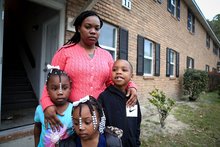Found 464 resources.
0
0
0
Type the phrase “aging in place” into a Google search, and you’ll likely see pictures of wheelchairs fitting comfortably through home doorways, bathtubs and showers with zero-step entrances, and open floorplans to facilitate seamless movement from room to room. But what is often missed in discussions promoting aging in place is that increasing livability doesn’t just mean adapting a home’s physical characteristics, it also means ensuring a range of cost options and housing types in a single community.
Topics: Disabilities, Health, Housing, Place-based, Seniors
0
0
0
Improved access to health insurance contributed to reducing worry and stress associated with paying rent/mortgage or purchasing meals among low-income people. Expanding health insurance access may have contributed to increasing the disposable income of low income groups.
Topics: Affordable Care Act, Health, Housing, Low-income, Medicaid / Medicare, Mental health, Research, Stability
0
0
0

Residents of a South Carolina public housing complex are demanding answers after two of their neighbors died from the gas.
Topics: Housing, Legislation & Policy, Low-income, Safety
0
0
0
If rent-control measures pass in all of the states and cities where they're currently on the table, nearly a third of all renter households in the United States could secure relief.
Topics: Housing, Legislation & Policy
0
0
0

Education Leads Home’s State Partnerships on Student Homelessness Project brings together policymakers and practitioners from with the goal of overcoming child and youth homelessness through education. Through the partnership, each state is committed to researching and implementing replicable best practices that address the most urgent needs of their unique homeless student populations. The State Partnerships on Student Homelessness Project is a nonpartisan effort to develop best practices that can be replicated by communities and states nationwide. In its inaugural year of the project,...
Topics: Child welfare, Education, Funding, Homelessness, Housing, Low-income, Partnerships, Youth
 Shared by Housing Is
on Mar 5, 2019
Shared by Housing Is
on Mar 5, 2019 0
0
0
The California Homeless Youth Project (HYP) is a research and policy initiative that highlights the issues and challenges faced by unaccompanied young people who are homeless or lack stable housing. This website provides state and local policymakers and others with information and policy resources specific to unaccompanied homeless youth, with a focus on young people in California.
Topics: Education, Homelessness, Housing, Legislation & Policy, Research, West Coast
 Shared by Housing Is
on Mar 5, 2019
Shared by Housing Is
on Mar 5, 2019 0
0
0

The 2019 state legislative season is in full swing, and SchoolHouse Connection is hard at work on 12 bills in 7 states (IN, KY, ME, NV, TN, TX, UT). We’re also supporting legislative advocates in 4 additional states (AZ, CA, MD, WA), and anticipate additional bills to be filed in LA, MO, NJ, and NC.
Topics: Child welfare, Education, Funding, Homelessness, Housing, Legislation & Policy, Low-income, Youth
 Shared by Housing Is
on Feb 28, 2019
Shared by Housing Is
on Feb 28, 2019 0
0
0

The city says it plans to move ahead with a costly, stopgap renovation of a New Orleans jail building to house dozens of inmates with mental health issues — but it also wants to keep its options open.
Topics: Criminal justice, Housing, Legislation & Policy, Low-income, Mental health, South, Supportive housing
 Shared by Housing Is
on Feb 28, 2019
Shared by Housing Is
on Feb 28, 2019 0
0
0

In a typical year, Cincinnati and Hamilton County have about 600 young adults between the ages of 18 and 24 staying in local homeless shelters, said Bonita Campbell, vice president of homeless youth services for Lighthouse Youth & Family Services. The KEYS plan aims to cut that number in half by 2020 and continue to reduce it from there, she said. To reach those goals, the plan is focused on the specific needs of young adults and how they differ from the needs of older people experiencing homelessness, Campbell said.
Topics: Homelessness, Housing, Low-income, Youth
 Shared by Housing Is
on Feb 28, 2019
Shared by Housing Is
on Feb 28, 2019 0
0
0
In this study, researchers conduct a literature review across public health, environmental health, medical, sociology, and urban planning journals to synthesize the research on the mental health effects of rat infestations on residents living in urban neighborhoods.
Topics: Health, Housing, Low-income, Mental health, Research, Safety
 Shared by Housing Is
on Feb 28, 2019
Shared by Housing Is
on Feb 28, 2019 0
0
0
Over the past two decades, criminal justice reform has focused on evidence-based interventions to prevent arrests and incarceration and to facilitate community reintegration. These initiatives represent a movement toward a less punitive, more holistic approach to public safety, targeting critical social factors that lead to and perpetuate criminal justice involvement. Because housing problems are often a key underlying factor for people’s involvement with the criminal justice system, there are ways housing interventions can help lessen criminal justice involvement. Decriminalizing...
Topics: Criminal justice, Homelessness, Housing, Legislation & Policy, Low-income, Research, Stability
0
0
0

The gas tax hasn’t budged since 1992, and highway trust fund is running on fumes. Could a Green New Deal pushed by Congress be a fix?
Topics: Community development, Funding, Housing, Legislation & Policy, Transportation
0
0
0
So, are the stars better aligned for an infrastructure bill this year? Unfortunately, rhetoric only goes so far, and Washington continues to suffer from the same elemental failure as it did in 2017—the U.S. lacks a clear infrastructure vision. Only when Congress is ready to truly debate what objectives the federal government hopes to achieve—and how to invest to advance those goals—can we begin to craft a transformative national strategy.
Topics: Community development, Funding, Housing, Legislation & Policy, Transportation
 Shared by Housing Is
on Feb 28, 2019
Shared by Housing Is
on Feb 28, 2019 0
0
0
With the active support of their residents, HABG converted a 34-passenger bus donated by Warren County Public Schools. The new mobile grocery store will offer fresh fruits and vegetables to families who currently live in a 'food desert' where the cost of eating healthy can be beyond their reach.
HAGB's new mobile grocery store will visit public housing developments and other low-income neighborhoods in Bowling Green to help residents lower their food costs by offering affordable groceries, including fresh produce grown at HAGB. More than 90 residents were surveyed and almost...
Topics: Food insecurity, Health, Housing, Low-income, Nutrition, Place-based
 Shared by Housing Is
on Feb 28, 2019
Shared by Housing Is
on Feb 28, 2019 0
0
0

Homelessness among students enrolled in schools from kindergarten through 12th grade has increased 70 percent over the last decade.
Topics: Child welfare, Education, Homelessness, Housing, Research, Youth
 Shared by Housing Is
on Feb 25, 2019
Shared by Housing Is
on Feb 25, 2019 0
0
0

For many years, the vulnerabilities of children experiencing homelessness have been glossed over on the assumption that their innate resilience would overcome the impact of homelessness. As someone who worked in the field, I would often hear, “Oh, they’ll never remember.” Today we know better. We know more about how the brain develops and about how trauma impacts brain development. There is a growing recognition among providers that these early years are critical for establishing a foundation for emotional, mental, and physical wellbeing, and that we don’t get a second chance at early...
Topics: Early childhood, Education, Homelessness, Housing, Low-income, Research, Safety, Stability
 Shared by Housing Is
on Feb 21, 2019
Shared by Housing Is
on Feb 21, 2019 0
0
0
New Orleans faced a major crisis in homelessness following Hurricane Katrina. In 2007, two years after the storm, there were more than 11,600 homeless people in the city. Since then, New Orleans stepped up its effort to tackle homelessness and has brought that number down 90 percent.
Topics: Homelessness, Housing, Legislation & Policy, Partnerships, South
 Shared by Housing Is
on Feb 21, 2019
Shared by Housing Is
on Feb 21, 2019 0
0
0
As the US Department of Housing and Urban Development (HUD) prioritizes programs to help households receiving rental assistance achieve economic self-sufficiency, researchers, policymakers, and advocates debate the utility of work requirements as an effective pathway toward economic self-sufficiency and the risks of offering rental assistance on a conditional basis. This study contributes additional evidence suggesting that work requirements, when implemented gradually and in context with hardship exemptions and local supports, can boost annual household income, earnings, and the adult-...
Topics: Asset building, Housing, Legislation & Policy, Low-income, Research, Workforce development
 Shared by Housing Is
on Feb 21, 2019
Shared by Housing Is
on Feb 21, 2019 0
0
0
This is a summary of HealthInfoNet’s (HIN) recommendations to pursue the integration of Maine’s Homeless Information Management System (HMIS) with Maine’s statewide Health
Information Exchange (HIE).
Topics: Data sharing, East Coast, Health, Homelessness, Housing, Partnerships
0
0
0
In 2018, Penobscot Community Health Care (PCHC), a Federally Qualified Health Center and The Hope House Health and Living Center in Bangor began a unique collaboration between health care and homelessness services utilizing HealthInfoNet’s Analytics and Reporting Platform (HARP). This tool identifies patients at high-risk for readmissions and connecting them to appropriate community and health services to prevent readmissions.
Topics: East Coast, Health, Homelessness, Housing, Partnerships
0
0
0
Recently, several of the BUILD communities approached us with a seemingly straightforward question about how many housing inspectors other cities have to enforce their rental codes and protect residents from unsafe housing. They intended to use this information to better understand the role housing inspectors play within different communities, since they are often a major stakeholder in identifying and addressing building related issues that directly impact the health of residents (e.g., chronic asthma).
Topics: Asthma, Health, Housing, Research, Safety
0
0
0
This series of papers provides an overview and framework for reaching out to stakeholders or potential partners from other sectors that may share your interest in collaborating and sharing data to improve community health. Knowing your audience will help your collaboration craft a successful and productive outreach strategy, strengthen your partnerships, and ensure ongoing sustainability by clearly defining and articulating the value of sharing data across sectors.
Topics: Criminal justice, Health, Homelessness, Housing, Medicaid / Medicare, Partnerships
0
0
0
Integrating health care data with data from other sectors helps address the holistic needs of individual patients while informing the development of population-level programs and policies that can improve outcomes, both in health care and other sectors. This paper provides guidance for those in non-health care sectors (e.g. housing, social services, community-based organizations) on effectively engaging and advancing conversations with health care stakeholders about collaborating to share data, focusing on the specific stakeholder of hospitals/health systems.
Topics: Health, Housing, Low-income, Medicaid / Medicare, Partnerships
0
0
0

Sen. Ben Allen (D-Santa Monica) wants to eliminate Article 34 of the state Constitution, which requires a citywide public vote before new low-income housing projects that receive public funding are built. The provision was added to the Constitution through a ballot initiative in 1950, and Allen said it was a relic in need of repeal.
Topics: Housing, Legislation & Policy, Low-income, West Coast
0
0
0
John King served in President Barack Obama’s cabinet as the 10th U.S. Secretary of Education. Secretary King is one of the most prominent voices on the connections between housing policy and education policy, particularly with respect to pervasive socioeconomic and racial segregation. We sat down with Secretary King in Los Angeles to discuss the state of modern-day school and housing segregation, why he prioritized integration while in office, promising practices on both the education and housing fronts, and why education advocates must also be housing advocates.
“As citizens, we need to...
Topics: Child welfare, Education, Homelessness, Housing, Legislation & Policy, Low-income, Partnerships, Youth
